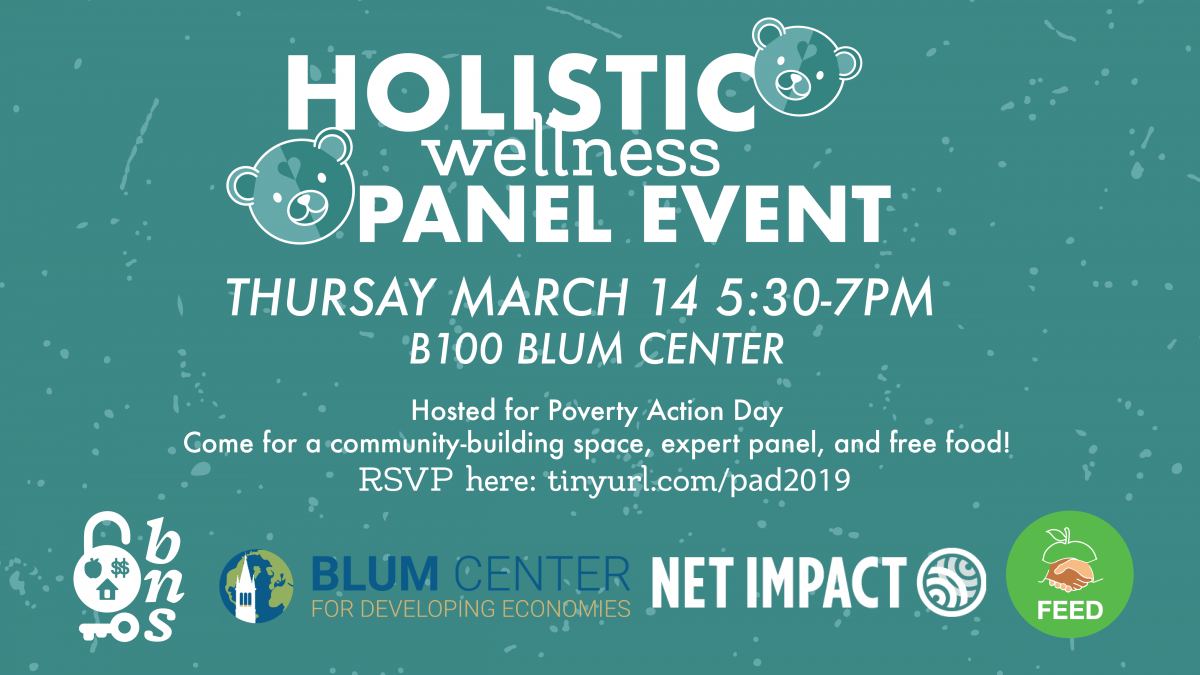According to a December 2017 report of the University of California Global Food Initiative, 44 percent of UC undergraduates experience some type of food insecurity, meaning they lack consistent access to nutritious food while they are students. And 5 percent of UC undergraduates experience homelessness, a figure that doubles when narrowed to UC Berkeley because of the Bay Area city’s high cost of living.
These problems don’t exist in a vacuum, an issue that representatives from the Student Action Committee for the Eradication of Poverty and Inequality (SACEPI) acknowledged in a March 14 event hosted by the UC Berkeley and UC Merced Blum Centers at Blum Hall. The discussion of about 70 students, faculty, and staff was moderated by Sara Tsai, program coordinator of the Basic Needs Community Program, and featured Kiyoko Thomas, case manager of the Berkeley Basic Needs Center, and Joyce Lee, a Campus Food Equity and Inclusion Policy Fellow of the Berkeley Food Institute.
Tsai, a third year student majoring in business administration, explained the Basic Needs Center was founded in February 2019 to fill a gap on campus. The center defines a basic need as food, housing, and wellness security, which collectively affect the mental, emotional, and physical health of students. The intersection of these needs, said Tsai, provide the backbone for the success and overall well being of any student or Berkeley resident.
Thomas agreed with this description, adding, “Holistic wellness is the connection of your mind, body, and spirit. All parts of our being are important—and it’s time to recognize that.”
Thomas, who is earning a Master of Social Work, said she joined the Basic Needs team last September, because she felt the the student service experience is fragmented.
“Students are expected to go to the Office of Financial Aid for one issue, Cal Housing for another, Counseling and Psychological Services for mental wellness—the efforts aren’t necessarily coordinated.”
Thomas pointed out that some Cal staff are also food insecure and are welcome to use the Food Pantry, which is located in the basement of the Martin Luther King Jr. Building. The pantry is open 10AM – 7PM on weekdays and 10AM- 2PM on weekends.
“Many workers are currently making minimum wage, but the cost of living is rising a lot,” she said. “Those who serve students also need to be served.”
The panel also discussed how academic pressure and Berkeley’s competitive environment can affect under-resourced students and staff. Thomas argued we need to “denormalize the idea that lack of sleep or working through the night is always good and helpful.” She advocated students check in with their friends and not abet their bad health habits. ”Make the norm about health, not about finishing assignments,” she said.
Lee added: “Ultimately, what’s in your environment should be good for you. If things become too much, seek help.”
Tsai advocated that students join the Food Pantry. She said it currently has 65 volunteers and needs more, as the program is the only student-run food source open seven days a week.
“We have Pop Up Pantries every Wednesday and Thursday at Moffitt and Wurster,” she said. “Come join us!”
